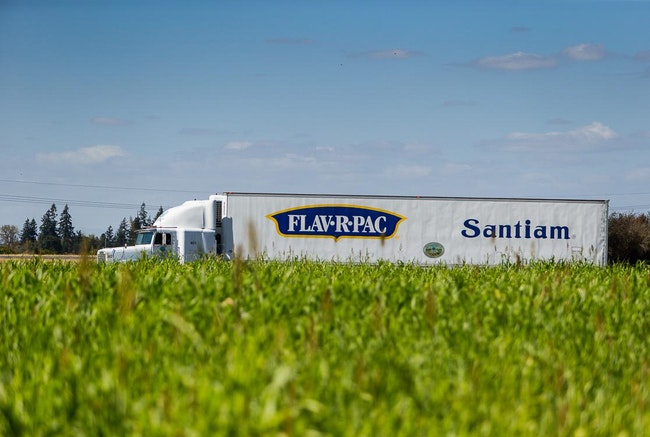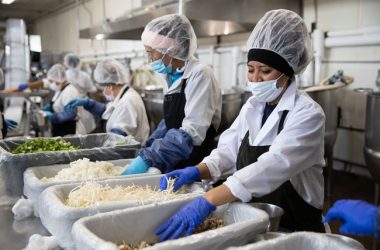
A NORPAC-branded truck transports frozen vegetables in Oregon. (Courtesy/Oregon Department of Agriculture)
In agriculture-rich Marion and Polk counties, the local economic development agency sees fertile ground for technology.
With the help of a federal grant, the Strategic Economic Development Corp. (SEDCOR) has launched the Northwest Ag Innovation Hub, which seeks to connect farmers with tech companies and entrepreneurs to make agriculture more competitive.
SEDCOR last week hosted an update of the project and a glimpse at how the mid-Willamette Valley could become a hub for agriculture and tech.
The initiative seeks to build a bridge between tech companies, whose outlook and business models have been shaped by the urban environments they’re based in, and agriculture. Bridging the two means artificial intelligence, automation and computer software could be a bigger part of farming. Farmers could have better data on soil quality or use drones to spray chemicals.
The project builds off of earlier efforts by the city of Independence and Polk County to facilitate collaboration between tech companies and local farmers. Last year, SEDCOR and the city of Independence took staff from the Technology Association of Oregon on a tour highlighting the day-to-day challenges of local farms and how technology could possibly help.
“Going out into the farms in the mid-valley was really eye-opening,” said Cara Turano, chief operating officer for Technology Association of Oregon, speaking on the Zoom call.
She said the visit showed how entrepreneurs could learn from how farmers are already using technology. She recalled visiting a dairy farm in Rickreall that collected data on the daily milking of the cows that the farmer’s son managed using his iPhone.
Alex Paraskevas, Polk County rural innovation catalyst who is leading the project, said local “ag-tech” meetups grew out of the effort but were canceled because of the pandemic. SEDCOR has taken the lead on the initiative after being awarded a $469,150 federal grant through the U.S. Economic Development Administration last September. The project seeks to find areas where technology can make agricultural operations more efficient and profitable.
“Every farm is an internationally competitive small business,” said Paraskevas.
He said the mid-Willamette Valley is a “high-value, specialty crop region” that produces over 170 commodities predominantly from family farms, such as hazelnuts, blackberries and others. The region is also home to businesses that manufacture harvesting equipment, food processing, as well as distribution and warehousing, he said.
Operating on tight margins, farmers already wear multiple hats as economists, meteorologists, HR managers and marketers, said Paraskevas. That doesn’t leave much staff or money to come up with innovations, he explained. Meanwhile, tech entrepreneurs in places like Portland are operating in environments that don’t have agriculture in mind, he said.
“We saw that the tech doesn’t necessarily go rural,” said Paraskevas. “And that a lot of solutions that are pitched to farmers tend to be sort of Silicon Valley solutions that are going in search of problems.”
Currently, the Northwest Ag Innovation Hub is seeking to build a “two-sided marketplace” by developing a network of local agricultural producers and entrepreneurs. He said that the project is currently a “little bit squishy” but will take shape in coming years.
The has partnered with the Iowa-based Ag Ventures Alliance and Tennessee-based AgLaunch.
Speaking on the Zoom call, Pete Nelson, executive director of Memphis-based AgLaunch, offered a preview of what the Ag Innovation Hub could offer.
He said that companies developing technological innovations for agriculture use a “fail fast, build, scale” model that’s not suited for farms.
But he said that as technology costs fall, new business models emerge and consumers ask where their food is coming from, agriculture could be primed for a wave of innovation.
He said About 36 startups have gone through AgLaunch’s business accelerator program and companies in its portfolio have raised $40 million. AgLaunch connects farmers to companies that have developed new technology. As the product is developed, farmers that helped test it get equity, said Nelson.
Nelson pointed to how farmers tested drones developed by Rantizo, an Iowa-based company, that deploy agricultural chemicals. The company has since raised $7.5 million and farmers that helped test the drones are getting a share.
“Our farmers in our rural distressed counties and our urban farmers actually have a piece of these deals,” he said.
He said other companies involved with AgLaunch are building analytical models for soil health and autonomous machines to plant cover crops.
Nelson said that farms in his part of Tennessee mostly grow cotton, sweet potatoes, peanuts and a few others. The mid-Willamette Valley with its wider variety of specialty crops could be fertile ground for even more innovations, he said.
“I just literally drool when you guys talk about some of the opportunities you all have,” he said.
Contact reporter Jake Thomas at 503-575-1251 or [email protected] or @jakethomas2009.
SUBSCRIBE: A monthly digital subscription starts at $5 a month.
GIFT: Give someone you know a subscription.
ONE-TIME PAYMENT: Contribute, knowing your support goes towards more local journalism you can trust.









